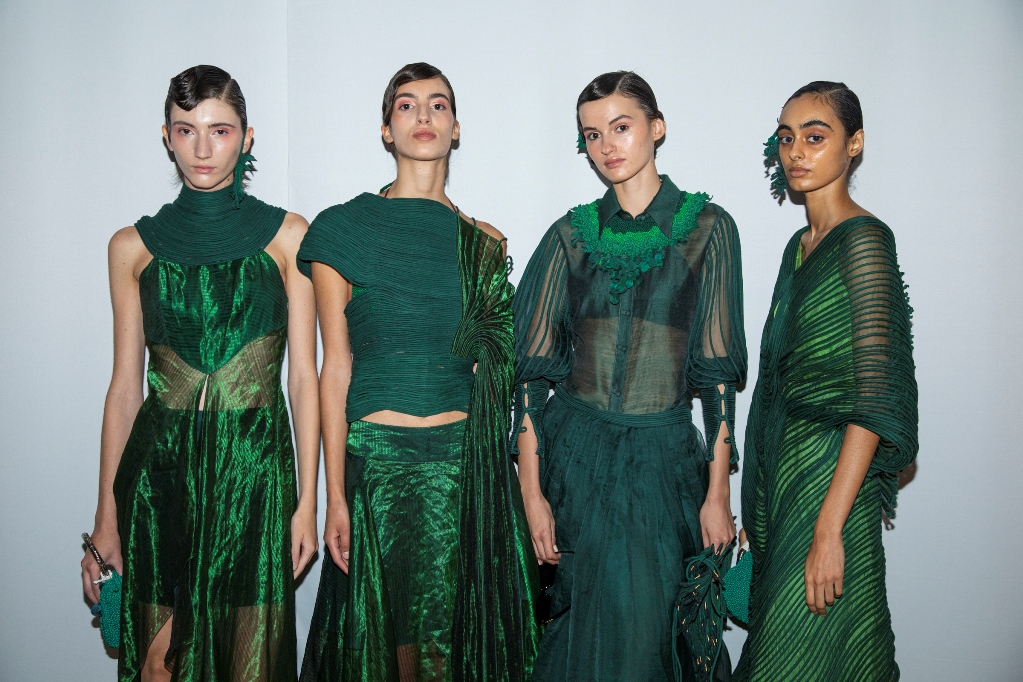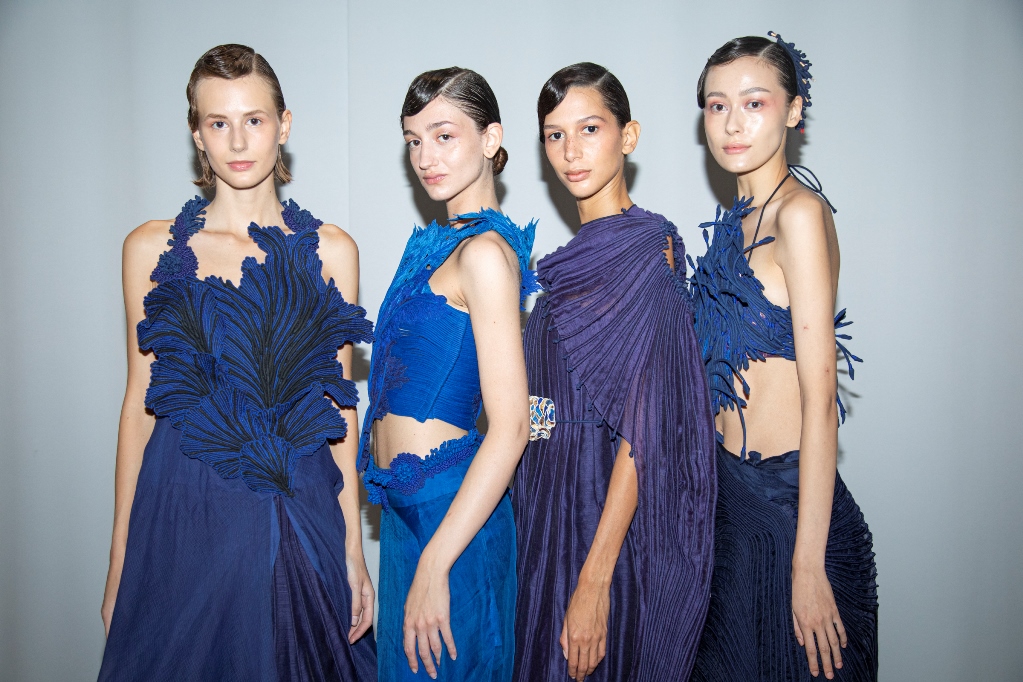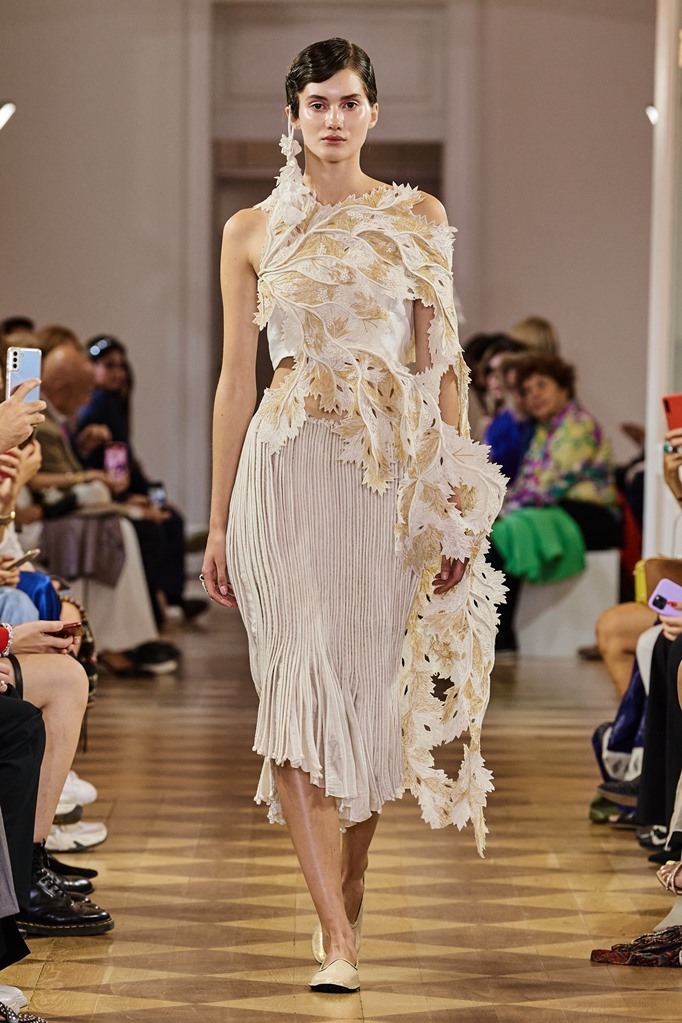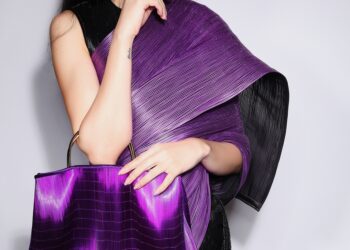BY RUKMA SALUJA
Sometimes it’s the desire to succeed and make it big that drives a person. For VAISHALI SHADANGULE, it was curiosity to see the world outside her little hometown that brought her out of her surroundings and into the world of fashion that then made her a globetrotter
Showing a collection on an international ramp is really the ultimate for a designer and when it is a woman from a small town in Madhya Pradesh, the feeling of achievement is perhaps akin to touching the stars or becoming one in the constellation. Vaishali Shadangule’s (label: Vaishali S) story bears telling even after the buzz around her showing in Paris has abated.
“I grew up in Vidisha where certain things were a way of life—living carefully, not wasting anything from food and water to clothing and household items. I didn’t know those things that were such a part of my life would have labels attached to them,” said Shadangule. A sari would be worn first on special occasions, then at home, then morph into a cushion and finally become a duster. This journey of the sari, she discovered, has tags—sustainable, recycled. “Going by the jargon now, that’s what we always did. These are not new concepts for us in India, especially small town India.” Living close to it meant an understanding and therefore a oneness with nature. “We knew to use only what we need so as to avoid waste.”
Haute couture is synonymous with pomp and lavishness; a large part of her conversation, nevertheless, is to do with aspects of sustainability. However much I try to move away from it, she comes back to it with an example when she’s trying to illustrate a point. For Shadangule there is no contradiction or dichotomy. We need to go back to slow fashion, she says. “When we bought new clothes, we would look after them and wear them on special occasions before they became our everyday clothes.


We didn’t buy more than we needed or throw away anything after only a few wears.” It’s no surprise when she advocates going back to those habits.
“My clothes are timeless,” she insists. “You can wear my clothes over many years. They don’t get dated.” She attributes this to growing up amidst nature in Vidisha, from where she continues to draw inspiration despite living in Mumbai for more than 20 years. “I don’t follow international fashion and colour forecasts. I take inspiration from nature. Nature is timeless, so how can my collections ever look dated. There will always be a timeless appeal about my clothes.”
Shadangule’s other source for ideas and inspiration are the weavers. When she decided to see how Chanderi is woven, she was mesmerised by how thousands of threads get woven together into a rich fabric embellished with design and embroidery. “This was one village producing this wonderful fabric,” she said. “Imagine the lakhs of villages in the country and the possibilities.” She started working with 10 families in the early years, developing designs and fabrics, and now works with 1,500 across the country from Ladakh to Karnataka and Assam, West Bengal, Madhya Pradesh and Maharashtra.
Shadangule’s journey out of Vidisha came about because she was desperate to get out and see the world beyond the confines of her little town. She did odd jobs in Bhopal and Baroda. “But I was always styling other people, although I didn’t know that’s what it was.” She would suggest this or that addition to a garment or certain colour combinations. It was only when she found herself in Mumbai that she realised there was a whole industry called fashion. She got a bunch of books and educated herself. She inherited a talent for sketching from her father who is an artist. Putting her ideas on paper was a breeze. It was much later when she was juggling a marriage, a young child and her fledgling business that she finally enrolled in a course in fashion design.
She works with varieties of silk, jamdani, Murshidabad silk, and blends with merino and pashmina that are automatically of high value. “These are clothes you will keep and my silhouettes have never kept in tune with trends.” If there is a signature style it is her use of dori, partly because she didn’t want to waste any fabric or threads. Initially, her staff were amused, finding her too thrifty, but are now used to it, she reveals with a chuckle. “Besides, apart from enhancing the look of the garment, you can use that for something else, should you want to.”


Thoroughly rooted in the Hindi heartland, as it were, Shadangule finds the whole idea of ‘fashion’ a little strange. “It’s an idea we have adopted from the West,” she insists. “See the countless ways in which women wear the blouse or the sari around the country-knotted choli, kurti-type blouse, with sleeves and without, long sari, short sari, half sari, dhoti-type sari. Travel a bit away from the big cities, into the smaller towns and villages, and you’ll see what I mean. Isn’t that fashion? Do those women follow fashion trends? And yet aren’t they fashionable? In that sense, haven’t we always been fashionable as a country?” It’s easy to see why she finds inspiration everywhere around her. Together with nature, of which she’s so deeply appreciative, it’s almost as if the muse resides within her.
There’s a spiritual streak that surfaces through the conversation whether it’s about her marriage, her daughter, her work with weavers, her business, her showing at the fashion weeks in Milan or Paris or New York. “These are connections of the soul. There’s a memory of something buried within you from another time. Otherwise how do you explain how somebody who has never held a brush becomes a great artist, or someone suddenly makes it big in music, or why someone comes into your life or goes away?”
She’s reluctant to comment on the trend of designers rolling out trousseau collections but is convinced that students at fashion academies are not given a full shot at unleashing their creativity. “I would advise them to put away their devices and not look at the internet for anything. They would surprise themselves at what they come up with.” Researching on the internet, she feels, limits ideas and there’s a tendency to recycle old ideas with minor changes and pass them off as one’s own.
For Shadangule there’s design everywhere. About her next collection, she has only this to say: “It will be something inspired by nature for sure.”








